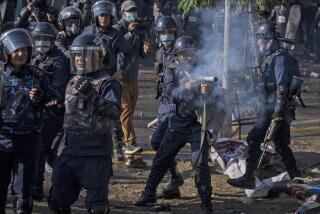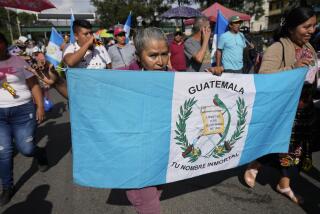Tens of thousands protest in Egypt for reforms, speedier trials
Tens of thousands of Egyptians protested across the nation Friday to demand political reforms and swifter trials for police and former government officials charged with killing hundreds of demonstrators during the revolution that toppled President Hosni Mubarak.
The protest, one of the largest since Mubarak’s ouster, highlighted growing fears that the early gains of the revolution are slipping away under the transitional ruling military council. The country is anxious about a new constitution, parliamentary elections and next month’s trial of Mubarak, who was depicted with a noose around his neck in posters across Cairo’s Tahrir Square.
The euphoria sparked by Mubarak’s resignation on Feb. 11 has given way to mistrust and recrimination. Many Egyptians, weary of demonstrations and clashes, crave quiet and stability. But activists and opposition leaders say the military and the interim government only react to demands when crowds take to the streets and face down riot police.
“The revolution is not finished. If we stop now, it would be like digging our own grave,” said Ali Badawi, a lawyer, standing in Tahrir Square amid banners depicting slain protesters, honored as martyrs, and former officials accused of corruption. “The trial of Mubarak and ex-members of his regime are not happening swiftly enough. This is not justice.”
Outrage has grown in recent weeks over the postponed trials of police officers and Mubarak officials, including former Interior Minister Habib Adli, who have been charged in the deaths of protesters. Some officers have been freed on bail, and only one policeman has been found guilty of murder. The officer, who has yet to be apprehended, was sentenced to death in absentia.
“None of those responsible for killing our sons have been indicted,” said Mohamed Amer, whose son was shot in the head and killed in Tahrir Square on Jan. 28. “We are not allowed to attend most hearings and after all this they adjourn the case and release the defendants on bail.”
He added: “We’re here to call for the cleansing of the judiciary system from corrupt judges. Everything is the same since the revolution and nothing has changed despite the toppling of Mubarak.”
The military council has, at times, moved to appease protesters. In what was viewed as largely an attempt to calm Friday’s demonstration, the government announced a day earlier that 25 former ruling party officials and Mubarak cronies, including leaders of parliament, would stand trial for slayings that occurred Feb. 2. That was the pivotal day in the revolution when men riding camels and horses stormed Tahrir Square while thugs hurled stones at protesters.
But the announcement did not deter demonstrators from pouring into the square with tents, loudspeakers and prayer rugs for what was billed as a “Day of Perseverance.” Shouts of “try them, try them” rang out as boys shimmied up lamp posts and waved flags beneath the charred headquarters of the former ruling National Democratic Party. Security forces kept at a distance.
“We want to sit in at Tahrir until the military council sits down and talks to the young activists,” said Ibrahim Reda, who has a business school degree but no job. “The military has abandoned us to talk to the political elite. We know the military does nothing until we rise up.”
The resolves of the military and the protesters are expected to be tested in coming days. Activists say they will remain camped in the square until they are convinced the government is moving on reforms. That is a provocation for the military, which has largely kept the square clear as a symbol that Egypt’s unrest is over. But last month, more than 1,000 people were injured in clashes when security forces quickly pushed back a crowd that tried to take over the square.
Hassan is a news assistant in The Times’ Cairo bureau.
More to Read
Start your day right
Sign up for Essential California for news, features and recommendations from the L.A. Times and beyond in your inbox six days a week.
You may occasionally receive promotional content from the Los Angeles Times.







